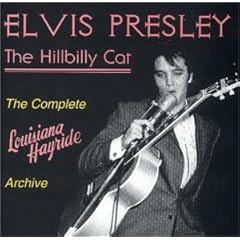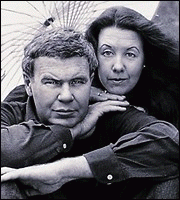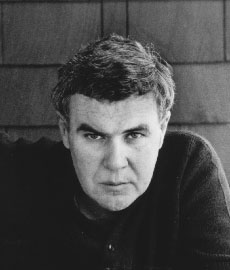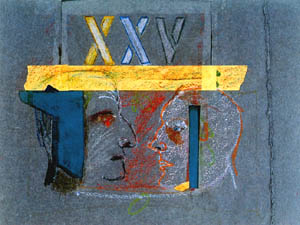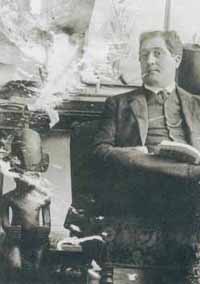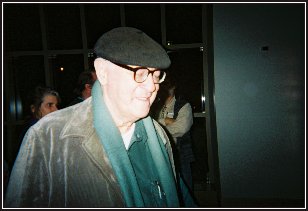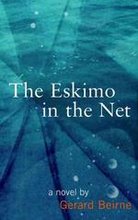It was a star filled night. Guillaume (see Hudson and Apollinaire Go Wireless) and I strolled across the Pont Neuf.
"Hudson," he told me, "I have been inspired by your beastiality."
"My dear Guillaume, you flatter me."
"Really Hudson. I have outdone myself on this occasion."
"Oh Guillaume, you are wont to exaggerate."
"Hudson, put aside your opium and listen:
LE BESTIAIRE
Orphée [ I ]
Admirez le pouvoir insigne
Et la noblesse de la ligne:
Elle est la voix que la lumière fit entendre
Et dont parle Hermès Trismégiste en son Pimandre.
La tortue
Du Thrace magique, ô délire!
Mes doigts sûrs font sonner la lyre.
Les animaux passent aux sons
De ma tortue, de mes chansons.
Le cheval
Mes durs rêves formels sauront te chevaucher,
Mon destin au char d'or sera ton beau cocher
Qui pour rênes tiendra tendus à frénésie,
Mes vers, les parangons de toute poésie.
La chèvre du Thibet
Les poils de cette chèvre et même
Ceux d'or pour qui prit tant de peine
Jason, ne valent rien au prix
Des cheveux dont je suis épris.
Le serpent
Tu t'acharnes sur la beauté.
Et quelles femmes ont été
Victimes de ta cruauté!
Ève, Eurydice, Cléopâtre;
J'en connais encor trois ou quatre.
Le chat
Je souhaite dans ma maison:
Une femme ayant sa raison,
Un chat passant parmi les livres,
Des amis en toute saison
Sans lesquels je ne peux pas vivre.
Le lion
O lion, malheureuse image
Des rois chus lamentablement,
Tu ne sais maintenant qu'en cage
A Hambourg, chez les Allemands.
Le lièvre
Ne soit pas lascif et peureux
Comme le lièvre et l'amoureux.
Mais que toujours ton cerveau soit
La hase pleine qui conçoit.
Le lapin
Je connais un autre connin
Que tout vivant je voudrais prendre.
Sa garenne est parmi le thym
Des vallons du pays de Tendre.
Le dromadaire
Avec ses quatre dromadaires
Don Pedro d'Alfaroubeira
Courut le monde et l'admira.
Il fit ce que je voudrais faire
Si j'avais quatre dromadaires.
La souris
Belles journées, souris du temps,
Vous rongez peu à peu ma vie.
Dieu! Je vais avoir vingt-huit ans,
Et mal vécus, à mon envie.
L'éléphant
Comme un éléphant son ivoire,
J'ai en bouche un bien précieux.
Pourpre mort!… J'achète ma gloire
Au prix des mots mélodieux.
Orphée [ II ]
Regardez cette troupe infecte
Aux mille pattes, au cent yeux:
Rotifères, cirons, insectes
Et microbes plus merveilleux
Que les sept merveilles du monde
Et le palais de Rosemonde!
La chenille
Le travail mène à la richesse.
Pauvres poètes, travaillons!
La chenille en peinant sans cesse
Devient le riche papillon.
La mouche
Nos mouches savent des chansons
Que leur apprirent en Norvège
Les mouches ganiques qui sont
Les divinités de la neige.
La puce
Puces, amis, amantes même,
Qu'ils sont cruels ceux qui nous aiment!
Tout notre sang coule pour eux.
Les bien-aimés sont malheureux.
La sauterelle
Voici la fine sauterelle,
La nourriture de saint Jean.
Puissent mes vers être comme elle,
Le régal des meilleures gens.
Orphée [ III ]
Que ton coeur soit l'appât et le ciel, la piscine!
Car, pêcheur, quel poisson d'eau douce ou bien marine
Egale-t-il, et par la forme et la saveur,
Ce beau poisson divin qu'est JÉSUS, Mon sauveur?
Le dauphin
Dauphins, vous jouez dans la mer,
Mais le flot est toujours amer.
Parfois, ma joie éclate-t-elle?
La vie est encore cruelle.
Le poulpe
Jetant son encre vers les cieux,
Suçant le sang de ce qu'il aime
Et le trouvant délicieux,
Ce monstre inhumain, c'est moi-même.
La méduse
Méduses, malheureuses têtes
Aux chevelures violettes
Vous vous plaisez dans les tempêtes,
Et je m'y plais comme vous faites.
L'écrevisse
Incertitude, ô mes délices
Vous et moi nous nous en allons
Comme s'en vont les écrevisses,
À reculons, à reculons.
La carpe
Dans vos viviers, dans vos étangs,
Carpes, que vous vivez longtemps!
Est-ce que la mort vous oublie,
Poissons de la mélancolie.
Orphée [ IV ]
La femelle de l'alcyon,
L'Amour, les volantes Sirènes,
Savent de mortelles chansons
Dangereuses et inhumaines.
N'oyez pas ces oiseaux maudits,
Mais les Anges du paradis.
Les sirènes
Saché-je d'où provient, Sirènes, votre ennui
Quand vous vous lamentez, au large, dans la nuit?
Mer, je suis comme toi, plein de voix machinées
Et mes vaisseaux chantants se nomment les années.
La colombe
Colombe, l'amour et l'esprit
Qui engendrâtes Jésus-Christ,
Comme vous j'aime une Marie.
Qu'avec elle je me marie.
Le paon
En faisant la roue, cet oiseau,
Dont le pennage traîne à terre,
Apparaît encore plus beau,
Mais se découvre le derrière.
Le hibou
Mon pauvre coeur est un hibou
Qu'on cloue, qu'on décloue, qu'on recloue.
De sang, d'ardeur, il est à bout.
Tous ceux qui m'aiment, je les loue.
Ibis
Oui, j'irai dans l'ombre terreuse
Ô mort certaine, ainsi soit-il!
Latin mortel, parole affreuse,
Ibis, oiseau des bords du Nil.
Le boeuf
Ce chérubin dit la louange
Du paradis, où, près des anges,
Nous revivrons, mes chers amis,
Quand le bon Dieu l'aura permis.



